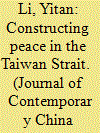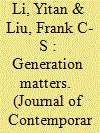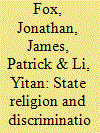| Srl | Item |
| 1 |
ID:
127776


|
|
|
|
|
| Publication |
2014.
|
| Summary/Abstract |
Economic integration in the Taiwan Strait has become increasingly stronger recently. Economic integration should have led to stronger political convergence. Why hasn't it occurred? I argue that democracy in Taiwan and the continuation of the single-party rule in China have created two very different social experiences. These different social experiences have formed two different identities. People in Taiwan are increasingly thinking of themselves as Taiwanese rather than Chinese. The growing level of popular nationalism in China has also altered the political identity of mainland Chinese. Such change could force Beijing to accommodate citizens' demand to act more toughly towards Taipei. Further political integration is still possible, but it would require another norm change, perhaps already in the making.
|
|
|
|
|
|
|
|
|
|
|
|
|
|
|
|
| 2 |
ID:
153386


|
|
|
|
|
| Summary/Abstract |
It has been widely assumed that perceptions about mutual relationships positively influence attitudes toward trade talks. The Sunflower Movement in Taiwan that took place in the spring of 2014 seemed to create an empirical puzzle, leading observers to believe that Taiwan’s younger generations hold conservative attitudes about trade talks with Mainland China. This study, based on an analysis of representative data collected before the movement, suggests that younger generations in Taiwan are hostile to Mainland China politically but support trade talks. In summary, the authors find that family orientation, national/ethnic identification, state/country identification, belief in Taiwan’s democratic impact, and generation serve as critical factors in the formation of positive attitudes toward trade talks. These findings contribute to the literature by providing a deeper insight into the dynamics of the Sunflower Movement and updating the political orientation profile of Taiwanese voters.
|
|
|
|
|
|
|
|
|
|
|
|
|
|
|
|
| 3 |
ID:
108685


|
|
|
|
|
| Publication |
2009.
|
| Summary/Abstract |
We address two issues neglected in cross-national ethnic conflict literature: the role of state religious exclusivity (SRE) in ethnic conflict and the causes of discrimination against ethnic minorities. We use data from the Minorities at Risk (MAR), Polity, and Religion and State (RAS) datasets to assess whether SRE influences the extent of discrimination and repression against ethnic minorities between 1990 and 2002. The results show that SRE is strongly and significantly associated with discrimination and repression against ethnic minorities. This is true both of ethno-religious minorities and ethnic minorities who are not religiously distinct from the majority group in the state.
|
|
|
|
|
|
|
|
|
|
|
|
|
|
|
|
| 4 |
ID:
057592


|
|
|
| 5 |
ID:
074652


|
|
|
|
|
| Publication |
2006.
|
| Summary/Abstract |
Recent literature argues that economic sanction threats should be more successful because both sender and target have an incentive to resolve their dispute before entering into costly sanction. Testing this assertion is somewhat problematic because threats are essentially nonevents-sanctions that were never deployed. This paper quantifies the U.S. threats to condition or revoke China's most favored nation status and shows that Washington's threats were not only ineffective but also counterproductive-Chinese accommodations decreased when the U.S. made acute threats but increased when Washington was cooperative. We conclude that for highly salient issues, sanction threats tend to be ineffective.
|
|
|
|
|
|
|
|
|
|
|
|
|
|
|
|